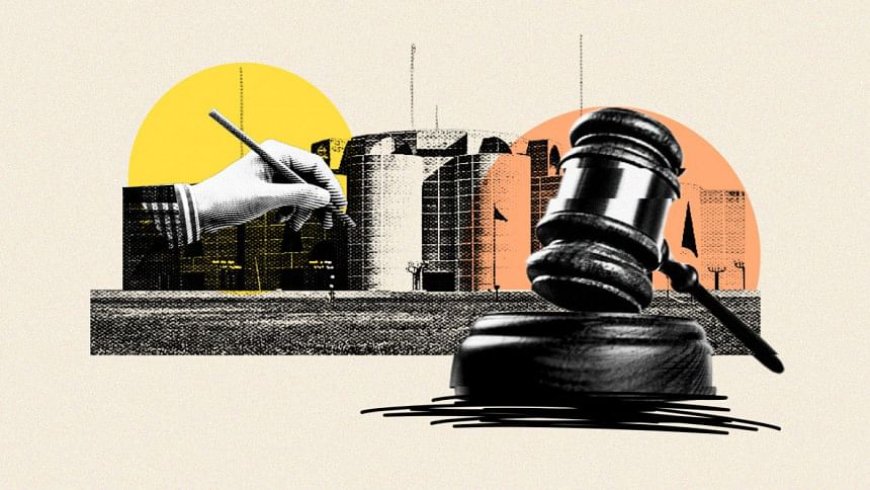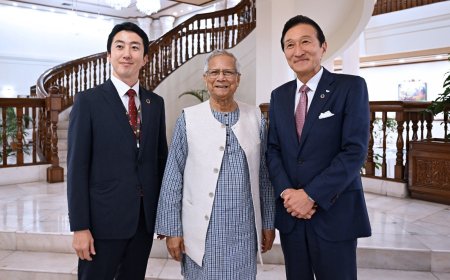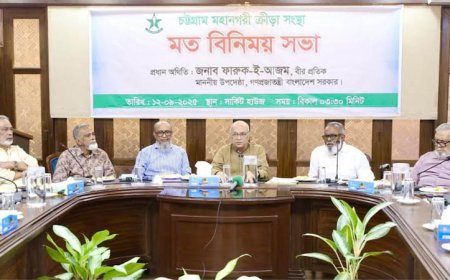Most Parties Push for Constitutional Reforms Targeting Preamble, Core Principles
Most Parties Push for Constitutional Reforms Targeting Preamble, Core Principles

Constitutional Reforms Take Center Stage Amid Broad Push for Change
Widely perceived as a product of the July 2024 uprising, the interim government has come to power with a sweeping mandate for reform. Public expectations are high that it will help shape a new state structure aligned with the aspirations of millions who marched in the streets demanding change. In this spirit, constitutional reform has emerged as a key priority for the current administration. Even before the Consensus Commission began its formal sessions, numerous political parties had already submitted proposals seeking changes to the constitution.
A significant number of parties have called for amendments to both the basic principles of the constitution and the preamble—two foundational components of the country’s legal framework. A total of 16 parties and political platforms, including BNP and Jamaat-e-Islami, demanded changes to the constitution's basic principles. Meanwhile, 15 groups sought revisions to the preamble, and 11 parties called for changes to both.
Parties Seeking Changes to Basic Principles
The 16 parties and alliances proposing changes to the constitution’s core principles include:
-
BNP (Bangladesh Nationalist Party)
-
Jamaat-e-Islami
-
Islami Andolan Bangladesh
-
Gono Odhikar Parishad (Nur faction)
-
Bhashani Anusari Parishad
-
Nationalist Democratic Movement (NDM)
-
12-party alliance
-
Khelafat Majlish
-
Ganosamhati Andolon
-
AB Party
-
Bangladesher Samajtantrik Dal
-
Jatiya Nagorik Committee
-
Communist Party of Bangladesh (CPB)
Parties Seeking Changes to the Preamble
The 15 parties advocating changes to the preamble include:
-
BNP
-
Jamaat-e-Islami
-
Rastro Sangskar Andolon
-
Bangladesh Jashod
-
Labour Party
-
12-party alliance
-
Ganosamhati Andolon
-
CPB
-
Jatiya Nagorik Committee
-
Islami Andolan Bangladesh
-
Khelafat Majlish
-
AB Party
-
Jatiya Gano Front
-
NDM
-
Bangladesh Kalyan Party
Proposals Regarding the Preamble
BNP wants to retain "Bismillah-Ar-Rahman-Ar-Rahim" along with the Bangla text and restore the preamble to its version before the 15th amendment. They propose reverting the phrasing to:
“We, the people of Bangladesh, having proclaimed our independence on the 26th day of March 1971 and through [a historic war for national independence], established the independent, sovereign People's Republic of Bangladesh…”
The current version uses "national liberation" instead of "national independence", a change made in the 15th amendment.
BNP also suggests restoring the original formulation of the guiding principles—faith in Allah, nationalism, democracy, and socialism (interpreted as economic and social justice).
Jamaat-e-Islami seeks substantial revision. They propose explicitly recognizing the July 2024 uprising by stating:
"We, the people of Bangladesh, have established the independent and sovereign People's Republic of Bangladesh declaring independence on March 26, 1971, through the historic struggle for national liberation; and are making all-out efforts to safeguard democracy in the country through different democratic movements, including the July Revolution of 2024."
They also call for enshrining nationalism, democracy, social and economic justice, full faith in Allah, and multiculturalism as foundational principles.
Jatiya Nagorik Committee advocates drafting an entirely new constitution through a constituent assembly. They propose recognizing the July uprising and including proclamations for both the first (1971) and second (2024) republics within the new preamble.
Ganosamhati Andolon proposes anchoring the new constitution in three pillars: the 1971 Liberation War, resistance against fascism and dictatorship, and the popular aspirations voiced during the 2024 mass uprising.
Islami Andolan Bangladesh emphasizes recognizing “the legitimate judgment of the people” as the basis of government formation in the preamble.
Khelafat Majlish wants to include two sentences that acknowledge both 1971 and the 2024 uprising:
-
“We, the people of Bangladesh, having declared independence on March 26, 1971, have established the independent and sovereign people's democratic Bangladesh through the historic struggle for national liberation.”
-
“We, the people of Bangladesh, established a democratic Bangladesh by overthrowing the erstwhile regime on August 5 through a historic uprising for the formation of a non-discriminatory state in July-August 2024.”
Rastro Sangskar Andolon and AB Party both propose sweeping changes. The AB Party suggests rewriting the preamble to declare the failure of the first republic and the birth of a second republic post-July uprising. It calls for moving beyond one-party rule and dynastic authoritarianism to build “Bangladesh 2.0.”
Jatiya Gano Front demands complete abolition of the 1972 constitution.
NDM suggests that the preamble reflect the principles of equality, human dignity, and social justice while also honoring the aspirations of the 2024 uprising.
Constitution Reform Commission’s Draft Preamble
The Commission recommends a revised preamble with dual historical references:
“We, the people of Bangladesh, who achieved independence through a people’s war as a continuation of the historic struggle for the liberation of the people of this land, and united in resistance against autocratic and fascist regimes to establish democracy…”
“We, in solemn memory of all the martyrs' sacrifices, pledge to uphold the ideals of equality, human dignity and social justice that inspired the people of Bangladesh during the 1971 Liberation War and the ideals of democracy and equality that united us in 2024 against fascist rule…”
Proposals on Basic Principles
BNP demands the repeal of the 15th amendment and restoration of the principles defined in earlier versions, emphasizing faith in Allah alongside nationalism, democracy, and socialism.
Islami Andolan Bangladesh believes that full trust in Allah must guide all state functions. They propose the following principles:
-
Equality, human dignity, and social justice
-
Accountability of the government
-
Elimination of fascism and hegemony
-
Rejection of toxic political culture
-
Promotion of values and education to produce ideal citizens
Gono Odhikar Parishad (Nur) and Bhashani Anusari Parishad both support incorporating the 1971 principles of equality, human dignity, and social justice.
The 12-party alliance proposes replacing "secularism" with "religious freedom for all" and "socialism" with "social justice and equitable wealth distribution."
Khelafat Majlish advocates enshrining belief in Allah, people’s participation, and a society free of exploitation, injustice, and discrimination.
Jamaat proposes principles grounded in nationalism, democracy, social and economic justice, faith in Allah, and multicultural values.
Ganosamhati Andolon calls for a non-discriminatory, democratic state rooted in the ideals of 1971 and the spirit of 2024’s student- and worker-led mass movement.
AB Party recommends a return to the principles of equality, human dignity, and justice.
Bangladesher Samajtantrik Dal supports retaining democracy, socialism, and secularism, while redefining nationalism to free it from imperialist influence. It also advocates inclusion of 1971 and 2024 ideals in the preamble.
Jatiya Nagorik Committee recommends five new foundational principles:
-
Equality
-
Human dignity
-
Social justice
-
Citizen rights
-
Democracy
Insaniyat Biplab Bangladesh wants to remove nationalism and socialism from the constitution, replacing them with religious values, popular sovereignty, freedom of life, and universal human rights.
The Constitution Reform Commission, meanwhile, proposes a new set of guiding principles:
-
Equality
-
Human dignity
-
Social justice
-
Pluralism
-
Democracy
They also recommend repealing Articles 8, 9, 10, and 12 of the existing constitution, which define nationalism, socialism, democracy, and secularism.
Proposals on State Religion
BNP and Rastro Sangskar Andolon both want to keep Article 2A unchanged as it currently stands following the 15th amendment. This article designates Islam as the state religion, while ensuring equal rights for followers of other faiths.
Jatiya Gano Front advocates complete separation of religion and politics, ensuring full religious freedom and equality.
CPB, Bangladesh Jashod, and Bangladesher Samajtantrik Dal propose repealing the article on state religion altogether, advocating for a fully secular constitution.
Khelafat Majlish wants to retain Islam as the state religion but ensure equal rights and dignity for all religious groups. It also proposes constitutional protection of the dignity of Prophet Muhammad (SM).
Bangladesh Jatiya Party (BJP) supports keeping Islam as the state religion and recommends including respect for the Prophet Muhammad (SM) as part of the constitution's moral foundation. They want any intentional insult to be a punishable offense under laws protecting religious sentiments and public order.
What's Your Reaction?






















































































